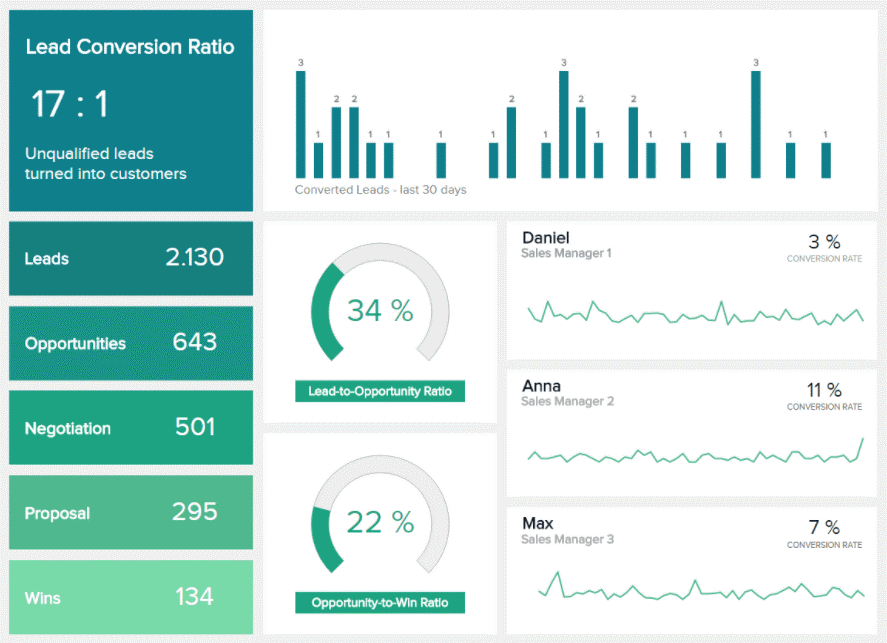
Sales management involves a wide variety of actions necessary to successfully build and manage a sales operation from developing a team to achieving sales goals and adopting tactics to meet them.
In this small business guide, we will walk you through some of the sales management processes, strategies, and resources to help your team meet your business goals for revenue and growth.
1. Sales Management

The act of managing and leading sales representatives to build strong relationships with prospects and close more businesses is characterized as sales management.
Sales Management Process
There are four major responsibilities of sales managers: people, strategy, action, and reporting. We’ll go over the four “steps” of the sales management process in the following sections.
People Management and Sales Hiring
To build an exceptional sales team, a manager must hire exceptional employees. The employment of a strong sales staff is the first step in the sales management process. Writing excellent job descriptions, interviewing qualified individuals, and working with HR to design equitable sales compensation plans are all part of this process.
This level also pertains to human resource management. Sales training and coaching, as well as team-building and morale-boosting activities, are all part of this.
Development and Management of Sales Strategies
Sales managers are responsible for establishing the company’s vision and strategy. Building the sales process that their team will follow is an important component of this. By following the same processes, this method keeps the team aligned and working toward the same goals, resulting in an autonomous, well-oiled machine.
Creating a sales process will also enable organizations to spot inefficiencies and areas where their team can improve.
Management of Sales Activity
A sales manager is responsible for overseeing their sales team’s daily activities, from prospecting to closing. This includes rejoicing over victories, accepting losses, and advocating for the team as a whole.
Sales management is about people as much as it is about sales. This means that managers should monitor everyday sales activities and resolve concerns and wins as needed.
Sales Reporting Management

Analyzing and reporting sales activity is the last step in the sales management process. Like the sales process, sales managers should also set up a systematized reporting process so their teams know when and where they’re being measured while also knowing what they can do to improve. Among the things this process might include are winning rates, average sales cycles, and lead-to-opportunity conversion rates.
The sales manager is also responsible for updating team objectives and standards based on this data.
2. Sales Management Techniques
Set compensation goals
To prepare your salespersons for success, create compensation plans that include specifics regarding their base salary and commission. Maintaining successful relationships with both existing and new clients requires establishing these expectations and plans for all team members.
Clear goals and quotas
Set targets and quotas for your entire team as well as individual reps to ensure that everyone is contributing and doing their part. Make sure everyone on the team understands the goals and quotas. This can be done in a group or one-on-one meetings.
Motivate your salespersons
A sales manager needs to be a motivator for their representatives, whether they are going through a difficult conversation with a customer, can’t meet their quota in the first month, or having a personal crisis. Ask your employees what motivates them so you can customize particular interactions to their preferences.
Act as a bridge between salespeople and management
The sales manager bridges the gap between salespeople and upper management. Your job involves acting as a liaison between these two groups of people and advocating for your salesperson as needed. If appropriate, you should also discuss salary increases or promotions for your salespeople with the management and HR departments, or simply share their accomplishments with the rest of the company.
Create revenue and sales reports
Various revenue and sales reports should be prepared and evaluated. It is the responsibility of a sales manager to collect and analyze data to evaluate your sales force individually and collectively. It is important not only for you to evaluate these reports, but also for your salesperson, so they know how they are performing and if they’re on track to meet (or, ideally, exceed) expectations.
Also, be sure to present these reports to your superiors so that the rest of the organization can see how well you’re doing and provide comments on what you and your team need to continue to grow the business.
Examine and improve the sales process
Your sales person assist in converting early-stage leads into loyal, satisfied clients through a sales process. A sales process, or framework, is nearly always in place for salespeople to follow and move their prospects closer to closing.
As a result, prospects will experience uniformity in their interactions, regardless of which salesperson is handling them, and will receive professional interactions from your representatives that accurately represent your brand.
However, keep in mind that as your company develops and evolves, the sales process will most likely need to be altered. You’ll need to make sure your sales process is up to date and relevant, whether it’s because you have new items, a larger team of reps, or various buyer personas.
This ensures that the sales process remains a useful and strong resource for your reps during their performance in your team.
3. Tools and Resources for Sales Managers

Sales management resources like CRM can help you simplify your work, execute tasks and duties more efficiently, have a greater impact on your team, and grow as a leader.
CRM such as HelloLeads.io provides you an option to capture, track and record lead information in a systematic manner.
HelloLeads CRM is a cloud-based and mobile-driven enterprise-class lead gathering, lead tracking, and lead management solution. The platform transforms and solves every sales professional’s pain in handling lead information and following up on sales leads. By giving deeper insights into prospects, encouraging rapid lead response, and boosting selling discipline, HelloLeads CRM assists sales teams in increasing conversion rates.
Start Managing Your Sales Force
You can create a dynamic and motivating culture for your sales force by investing in their training and development, which will help to construct a strong and productive team.
Share this blog :











Leave a Reply